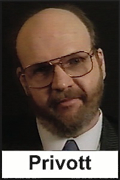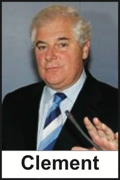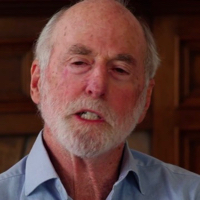Rascals case in brief
In the beginning, in 1989, more than 90 children at the Little Rascals Day Care Center in Edenton, North Carolina, accused a total of 20 adults with 429 instances of sexual abuse over a three-year period. It may have all begun with one parent’s complaint about punishment given her child.
Among the alleged perpetrators: the sheriff and mayor. But prosecutors would charge only Robin Byrum, Darlene Harris, Elizabeth “Betsy” Kelly, Robert “Bob” Kelly, Willard Scott Privott, Shelley Stone and Dawn Wilson – the Edenton 7.
Along with sodomy and beatings, allegations included a baby killed with a handgun, a child being hung upside down from a tree and being set on fire and countless other fantastic incidents involving spaceships, hot air balloons, pirate ships and trained sharks.
By the time prosecutors dropped the last charges in 1997, Little Rascals had become North Carolina’s longest and most costly criminal trial. Prosecutors kept defendants jailed in hopes at least one would turn against their supposed co-conspirators. Remarkably, none did. Another shameful record: Five defendants had to wait longer to face their accusers in court than anyone else in North Carolina history.
Between 1991 and 1997, Ofra Bikel produced three extraordinary episodes on the Little Rascals case for the PBS series “Frontline.” Although “Innocence Lost” did not deter prosecutors, it exposed their tactics and fostered nationwide skepticism and dismay.
With each passing year, the absurdity of the Little Rascals charges has become more obvious. But no admission of error has ever come from prosecutors, police, interviewers or parents. This site is devoted to the issues raised by this case.
On Facebook
Click for earlier Facebook posts archived on this site
Click to go to
Today’s random selection from the Little Rascals Day Care archives….
Click for earlier Facebook posts archived on this site
Click to go to
Today’s random selection from the Little Rascals Day Care archives….
Among the costs of incarceration: a marriage
Jan. 9, 2012
Perhaps the most inexplicable of the prosecution’s targets was 40-year-old Scott Privott, owner of an Edenton video store and shoe repair shop.
Son of a district court judge, he served as president of the local country club. No evidence ever surfaced to support the rumor that Privott’s video store was a hub for child pornography or to counter his claim never to have even set foot on the Little Rascals premises. According to the prosecution, children at the day care identified him as a perpetrator.
 In April 1993 his bail was reduced from $1 million to $50,000, and he was released on bond from Chowan County Jail. Fourteen months later, Privott accepted the state’s offer of a plea of no contest, still insisting on his innocence, and received a sentence of time served with an additional five years probation.
In April 1993 his bail was reduced from $1 million to $50,000, and he was released on bond from Chowan County Jail. Fourteen months later, Privott accepted the state’s offer of a plea of no contest, still insisting on his innocence, and received a sentence of time served with an additional five years probation.
He says he has been happily married for 14 years and doesn’t want to reveal where he now lives. I asked him to share some recollections about the case:
“Bob and I were more acquaintances than close friends. I played golf with him when he was the pro. Bob rented movies from my store, and he and many others would come by and have coffee and just talk. In fact, many of the accusing parents rented movies from me. (Bob Kelly suspects Privott may have been drawn into the case when Kelly’s truck was seen parked in front of the video store.)….
“In jail I spent the time reading and watching TV. We weren’t allowed newspapers, so I wasn’t sure what was being written about the case…. At times it was hard to keep my spirits up. I had gallbladder surgery and recuped at Central Prison in Raleigh and at McCain (Correctional Hospital in Raeford, closed in 2010)….
“Jail had just a walled-in area for outside activity, but at McCain I enjoyed being able to walk around the yard with others awaiting trial…I was in “safekeeping” and actually met some intelligent, thoughtful people. I never had any problems, as the majority knew the entire LRDC case was a farce….
“My wife came on Sundays, but as the years rolled on the visits were less and less, and then I noted a change I had been kind of expecting. She brought my mother with her, and in the later years she stood back and kind of let the visits be between mother and son. It turned out she had met someone new in her life. She didn’t have the nerve to tell me, but I figured it out….”
French prosecutors erred – and admitted it!
 April 4, 2012
April 4, 2012
“An appeals court Thursday overturned the conviction of six people accused of participating in a pedophilia ring in northern France five years ago, unraveling one of the most mismanaged cases in French judicial history and leaving the nation asking how the court system could have gone so awry.
“ ‘I apologize to the acquitted and their families,’ Justice Minister Pascal Clement said at a news conference after the verdict was announced in Paris.
“He ordered a triple investigation of the police, judiciary and social services involved in the case…. ‘I want the French people to know that I will get to the bottom of this,’ he said.
“Paris’s chief prosecutor, Yves Bot, had personally asked the appeal court to acquit the six, calling the case a ‘true catastrophe’ and demanding an investigation into who was responsible for such a gross miscarriage of justice. ‘We must do what is necessary to make sure this doesn’t happen again,’ Bot said.
“But others were heartened by the appeal, saying that it showed that the courts were capable of self-criticism and self-correction.
“ ‘That’s indispensable in a democracy,’ said Dominique Wolton, a sociologist at France’s National Council for Scientific Research.
“The case began in 2000 in the town of Outreau after a number of children told a teacher that they had been abused.
“It was marred by deep doubts from the beginning, said Yves Jannier, France’s attorney general.
“He noted that the investigative report by the police in July 2002 found ‘more doubts than certainties’ in the accusations, but said, ‘No one had enough critical sense to stop the machine.’ ”
– From the International Herald Tribune, Dec. 2, 2005
Thanks to lawyer-neighbor Lou Lesesne for steering me to this account of the Outreau Affair.
Although the case differs in numerous significant ways from such U.S. ritual-abuse prosecutions as Little Rascals and McMartin, I was most struck by the readiness of French officials to acknowledge and apologize for a justice system gone crazy.
Soon after, president Jacques Chirac wrote letters to 13 acquitted defendants and to the widow of a defendant who committed suicide in prison awaiting trial: “Justice is the soul of the republic. We have the imperative duty to draw all the lessons from the immense sufferings endured by all the accused whose innocence has now been established.”
How to explain the French state’s humane response to its costly misdeeds, while our own prosecutors, attorneys general, governors, et al., keep silent?
Why aren’t they too “capable of self-criticism and self-correction”?
Why don’t they too recognize “the immense sufferings endured by all the accused”?
Child-witnesses, now in their 30s, reject call to speak up

YouTube
Dr. Lee Coleman
July 7, 2019
For those seeking to understand the Little Rascals Day Care case one particularly intriguing question remains: How do the former child-witnesses, now well into their 30s, look back at their central role?
Do they believe today that their testimony was accurate? Or have they come to realize that those bizarre sexual accusations – as well as the accounts of sharks, spaceships and burning babies – were products of sheer fantasy? And that they had been relentlessly manipulated by the prosecution’s therapists?
Last month I sent letters to the Little Rascals witnesses in hopes that they would be ready to talk about their experiences. Here’s what I said:
“I apologize if this letter is unwelcome. For the past eight years I have been researching the Little Rascals Day Care case. I’m writing you because as a child you were a witness for the prosecution in Bob Kelly’s trial in 1991-92. The court records include a passage describing your testimony.
“I blog at littlerascalsdaycarecase.org, and I have worked with Duke Law School to build an archive on the case. My aim is to persuade the State of North Carolina to issue the Edenton Seven a statement of innocence similar to the one given the defendants in the Duke lacrosse case.
“I don’t know how you look back at your involvement in the case, and you are certainly under no obligation to tell me. But if you might be willing to share your recollections – however they might agree or conflict with your testimony – please contact me….”
In the decades since the “satanic ritual abuse” day care prosecutions few child-witnesses have chosen to step forward. One who did so – anonymously – looked back with sadness at the McMartin case: “It is my belief, after years of treatment centers and therapy, that nothing physical happened to me…. Mentally, well, that’s a different story. How about paying attention to the kids that were scarred from this therapy? Do you think that just because there was most likely no physical abuse that we didn’t still suffer?”
After receiving no responses to my letter, I asked Lee Coleman what he would advise those still-silent Little Rascals child-witnesses. Dr. Coleman, a Berkeley, Calif., psychiatrist, has testified in some 800 child sex-abuse cases, of which perhaps 100 involved day-care or preschool allegations. In this YouTube presentation he analyzes the McMartin Preschool case.
He replied to my request with this open letter (condensed) to the Little Rascals child-witnesses:
First, it is now recognized by all parties – prosecutors, judges, defense attorneys, academic students of memory and suggestibility in young children being interviewed for possible sexual abuse – that the methods used in Little Rascals had serious potential to influence memory, often creating a mental picture that to the child is indistinguishable from an actual memory of actual events.
This brings us to the very heart of my message to you, as you seriously consider whether justice may be served by your coming forth with what you remember of how you were interviewed and who you spoke to prior to the trial. Remember, it is not your memories of what did or didn’t happen at the school that is important, but your memories of how you were interviewed, and of who you spoke with during the time before the trial. This is the crucial time, and these are the crucial events, that any fair decision about the meaning of what you said during the trial can be best judged.
What I cannot stress enough is that if you testified to things that were not true, that was through no fault of yours, because such false testimony would be the fault of poor and suggestive interview methods, therefore neither lies, nor any indication of your sincerity as a child. If a child says things that he or she believes are true, because interview methods cause the child to accept ideas coming from interviewers rather than the child’s actual memory, then the fault lies with the interviewers and not the child.
To blame the child for misdeeds of poorly trained interviewers is, in my opinion, a kind of child abuse. I have testified about these issues hundreds of times, and most recently spoken about these issues as part of my continuing effort to bring understanding to our nation’s system of bringing justice to the area of sexual abuse of children. Such abuse, when it happens, calls for punishment of perpetrators and support of victims. When unprofessional conduct by prosecutors and their assistants causes children to be victims of suggestions that create false memories, this also calls for a better response from our society.
I thank you for taking the time to reconsider that time in your life and reconsider whether you might bring the best resolution to the efforts of Mr. Powell and others seeking justice in the Little Rascals Day Care case.
Sincerely,
Lee Coleman, MD
Kelly defenders risked ‘financial and social suicide’
July 13, 2015
Throughout the long unfolding of the Little Rascals Day Care prosecution, outsiders often sought to determine the “mood of Edenton.” This was a challenging task even in the early days of the case, and it became just about impossible after the first “Innocence Lost” episode cast the town in a starkly unflattering light.
The default response to anyone with a notepad: Go away.
In 1996, however, a defense attorney weighing Edenton as a site for Bob Kelly’s possible retrial had better luck. His case notes include this candid and chilling evaluation from a longtime Edentonian:
“(The resident) didn’t believe that any of the defendants, but especially Bob, had a chance of getting a fair trial in Edenton. Although the constant talk of Little Rascals has died down, he said people still wouldn’t dare mention the idea of innocence. He believes that probably half of (Chowan County) either doesn’t believe Bob did it or at least not to the extent alleged. He believes the largest group of ‘nonbelievers’ to be those of lesser means, and especially minorities.
“He said that anyone of means or in any type of business in town would be committing financial and social suicide if they voiced any belief in Bob’s innocence.
“He said that even if he knew Bob to be innocent, or less guilty than charged, he would have a hard time voting so as a juror in light of the lifelong social repercussions. If there was even one or two jurors who believed Bob was guilty, they would be able to pressure everyone else into voting with them….”











0 CommentsComment on Facebook